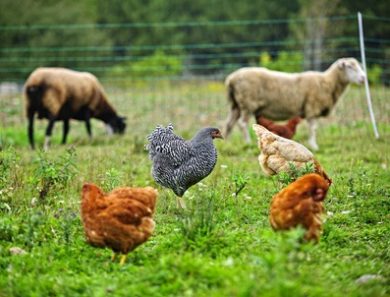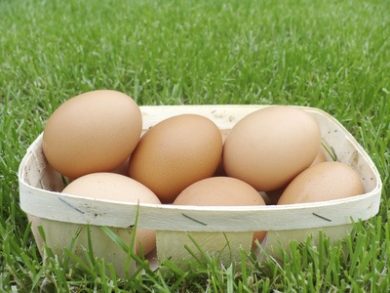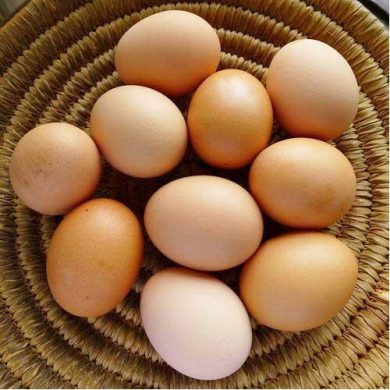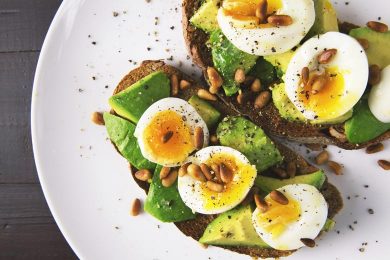
All about Eggs
Eggs used to be a weekend thing in our house when I was younger, for those lazy mornings when we had time at hand and wanted to enjoy a more elaborate and leisurely breakfast. Having eggs for breakfast was more like a special “treat”. Surely this also had something to do with the fact that we were told not to eat more than 2 eggs a week because anything more than that was supposed to be bad for your cholesterol.
I now know that eggs are one of nature’s most perfect foods and prepare them often. They are good for you, easy to prepare, high in nutrients, healthy fats and they contain high quality protein. Protein is essential for building and repairing body tissues and for overall healthy function. It should play an important part in every meal and especially our “modern” breakfasts are often lacking in protein. Eggs are a perfect, versatile and easy way to ensure an adequate and high quality protein intake. In this article I will give you a breakdown of the nutrients, health benefits as well as a more detailed look at the different types of eggs you find in stores today and which ones you should choose.
The nutrition angle

Protein
Eggs contain the complete range of essential amino acids, which makes them a perfect and high quality source of protein. On three of the four scientific scales for protein quality used for the past few decades eggs consistently score the highest, beating other foods such as milk, beef, whey and soy.
Fat
Eggs have been avoided for years by people because of their high levels of saturated fat and the effect it was supposed to have on cholesterol levels. We now know that there is a difference between dietary sources of cholesterol and blood levels of cholesterol. In fact, studies have shown that egg consumption has no effect on overall blood cholesterol levels and what’s more: another study found that eating whole eggs actually increased HDL which is the heart-protective, “good” cholesterol.
You will find eggs in stores that claim higher levels of Omega 3s which is the kind of fat we need more of in our diets. Some companies add Omega 3 oils to the hens’ diet to increase the level. If the diet is unnatural to begin with, this does not make for a superior egg. There are ways to naturally increase the Omega 3 levels in eggs and that is through pasture feeding where the hens are able to consume generous amounts of legumes that are high in Omega 3 fatty acids such as clover and alfalfa. This is obviously a better practice and if you can find eggs that have higher levels of Omega 3s through pasture feeding, you should go ahead and buy them.
Choline
Eggs are one of the best sources of choline which is essential for cardiovascular and brain function as well as the health of your cell membranes. Additionally, it has been linked to the production of the so-called “happiness” hormones: serotonin, dopamine and norepinephrine. One study has indicated that 90% of Americans are deficient in choline.

Lutein and Zeaxanthin
Lutein and zeaxanthin are two types of carotenoids that are important for eye health. They are often prescribed as supplements to help prevent eye diseases as well as age-related eye conditions such as macular degeneration and cataracts. As with most nutrients, bioavailability of these nutrients is higher when consumed through natural sources such as eggs compared to taking supplements.
B Vitamins
B vitamins are essential for growth, development, and a variety of other bodily functions. They play a major role in the activities of enzymes, proteins that regulate chemical reactions in the body, which are important in turning food into energy and other needed substances. Eggs contain all B-Vitamins: B1, B2, B3, B5, B6, B9 and B12.
Minerals
Eggs contain trace amounts of more than 15 vitamins and minerals. Some of the minerals they contain are difficult to obtain from other foods. Examples are selenium and iodine.
Sulphur
The high sulphur content in eggs helps with the absorption of Vitamin B, with liver function as well as the production of collagen and keratin, which helps to create and maintain shiny hair, strong nails and glowing skin.
The whole egg
An egg is a complete, whole food and should be eaten like that. Eating egg white omelettes will have you missing out on an important part of the nutrients that are in the yolk. Eat the whole egg.

The origin of the eggs on your plate
As with all the other food on your plate, it is important to know where your eggs came from. The hens that laid the eggs should ideally be leading a natural lifestyle, which enhances their health, welfare as well as the quality and the nutritional value of the eggs they produce. A natural lifestyle in this case means they should be spending time outdoors walking, nesting, pecking, wing-spreading etc., and eating a natural diet that consists of worms, grubs, insects, legumes and grasses. Unfortunately, most eggs found in stores today are from large-scale factory farms that use practices that are the complete opposite of being natural.
Hens are packed into cages with little to no outdoor access and debeaking and forced moulting are still common practices in large-scale egg production. Although there still is a lack of regulatory standards to ensure natural lifestyles for hens, labelling provides us with a bit more insight into the origin of the eggs we choose to consume. Labelling laws do vary from country to country and whereas there is a bit more transparency in places like the US and Europe, there is little to none in many countries in Asia. The labelling terms that you find on egg packaging can be quite confusing. Some of the terms used are:
• cage free
• free range
• free roaming
• pastured
• pasture raised
• organic
• Omega 3
• Omega 3 enriched
Next is an explanation of some of these terms, taken from www.whfoods.org:
Organic eggs – The label organic requires feeding with certified organic feed. It also requires outdoor access but exact standards are not well defined.
Free range eggs – Hens must have outdoor access but not continuously.
Pastured eggs – Hens must have continuous access to the outdoor during day and night but this does not exclude the use of pens.
Cagefree – The legal use of this term does not exclude indoor confinement, nor does it require outdoor access.
Omega 3 – Omega 3 is a polyunsaturated fat that we generally get too little of in our diets. As explained before, eggs can have higher levels of Omega 3 fats through supplementing the hens’ diets with Omega 3 oils or through pasture feeding. Pasture feeding is a much better way as it will ensure a generally higher nutrient value as well as better living conditions for the hens.

Which eggs do you choose?
Your best bet would be to choose eggs that are organic (which lowers the risk of contamination and ensures a higher nutrient quality) and pasture raised (with continuous outdoor access). If you really want to know what you are putting on your plate, you should try and find a small, local farm that keeps smaller flocks and that takes care to ensure their hens lead natural lifestyles and eat natural diets. It might take a bitof effort but it is possible do to so.
While living in Mumbai for example I managed to find a way to get great eggs although it wasn’t easy. They are very different from the standard mass produced eggs: they are not squeaky clean, the shells are all of different sizes and colours, thei absolutely delicious. So from experience I can say that it is well worth the effort to try and source the right kinds of eggs. It feels good to know you are eating something pure, healthy and wholesome.
Egg allergy
Since we are covering eggs in great detail, it is important to point out here that eggs are on the list of 8 foods that are most closely associated with food allergy according to the US Centre of Disease Control. If you are allergic to eggs, you will probably know it by now and if not, this is something to be aware of. Furthermore, eggs can be inflammatory for some people. Nutrition is all about bio-individuality so be mindful of that.

Egg storage
Eggs have a porous shell with a protective coating and washing eggs removes this protective coating. If at all they need to be cleaned before storage, wipe with a dry cloth. You can wash the eggs before using them but with room temperature water. Store eggs in the refrigerator in their original carton or in a covered container so that they don’t absorb odours or lose moisture. Storing them with the pointed end down will prevent the air chamber and yolk from being displaced. So there you go: all you ever wanted to know about eggs. Enjoy them. As always, tune in to your body to know when to eat your eggs and choose them well.
Be well,
MONIQUE



